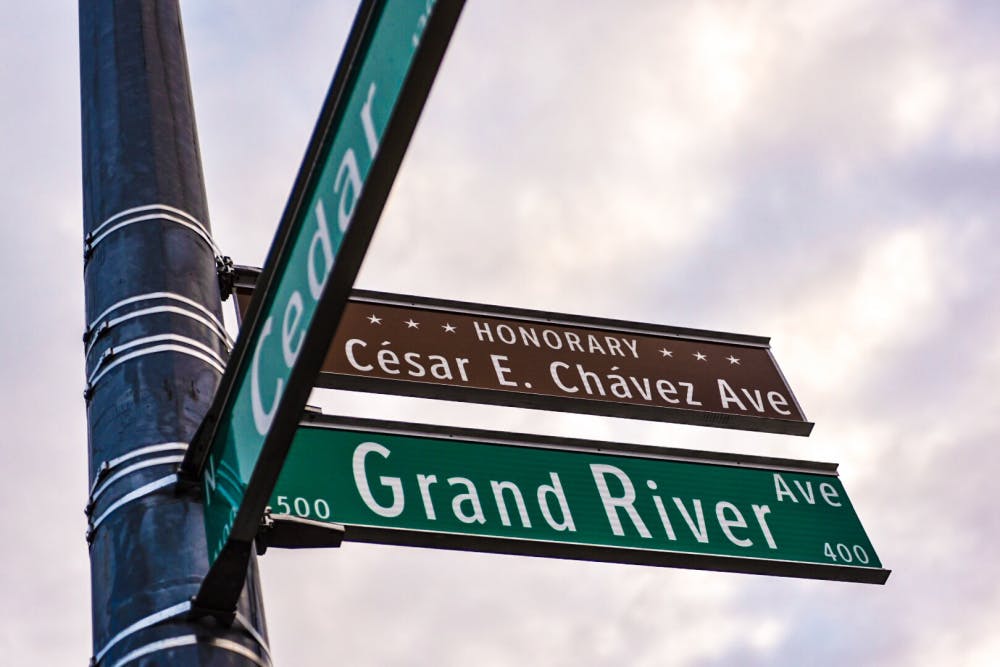After 22 years of going door to door for signatures, protesting and rallying at Lansing City Hall, the Lansing's Latino community has officially received the decision they’ve been waiting for.
On Oct. 30 the Lansing City Council voted for a portion of East Grand River Avenue beginning at Oakland Avenue and West Grand River Avenue beginning at Washington Avenue to Pine Street to be renamed to honor civil rights activist César Chávez, as it was many years ago.
Previously, the section was the Honorary César E. Chávez Avenue; now the name is official.
Chávez was an activist, leader and labor organizer who dedicated his life to improving the hardship he knew too well, migrant farm work. As an advocate of nonviolence, Chávez lead millions of Americans to the improvement of working conditions, pay and equality for migrant workers.
MSU Office of Inclusion Community Outreach Coordinator Ignacio Andrade has been directly involved with the effort, as the speaker on behalf of Lansing and has been advocating for the renaming since 2009.
Chávez spoke on MSU’s campus multiple times and even marched through the community, from Saginaw to Lansing.
MSU’s Library has one of the only history collections of Chávez in the nation, according to Andrade.
“There’s a deep history of activism around César Chávez and him to be connected to this community and we highlight that in honor of him in the work he did, but also continuing in the work in today,” Andrade said.
Andrade also founded the regional César E. Chávez Commemorative Celebration on behalf of MSU and has coordinated it each year since 2009. The celebration honors his life, legacy and continuing work.
The Latino community has worked continuously over the years to have Chávez’s name placed back on the street sign officially since it was taken down in 1995.
According to Andrade, Chávez’s name was first placed on street signs in 1994 but it was later revoked by the city and reversed to Grand River Avenue, with the help of a local radio station who advocated for the recall.
Andrade said that made Lansing the only city in the nation who had revoked a Chávez street and not given it back until now.
“I want to correct the misconception that it is only about the name of a street," he said. "This is about much more than the name of a street, it is about building an inclusive community that is welcoming to all people and cultures.”
Andrade said Lansing is a capital city with two paths to choose from — one towards hostility and hate, and the other towards acceptance and inclusion.
“Lansing has had recent and historical demonstrations of exclusion, intolerance and even hate so that is exactly what I am talking about,” he said.
Andrade said Lansing has seen violent anti-Latino hate crime as recently as July of this year, when two white males assaulted a Latino immigrant and stapled a note with a racial slur to his stomach.
“It feels like it’s totally not just about a street name, it’s about respect for our culture, respect for all cultures,” he said. “This is why, when we are continually attacked and denied the ability to even see representations of ourselves in the community this feels like an additional attack.”
“This has been a long time coming, 22 plus years, I’m excited. I think we’re going to make history and we’re in a different time where we’re not going to be seeing the referendum that we saw 22 years ago,” 1st Ward Lansing City Council Member Jody Washington said.
Some people are confusing the meaning of this event and the point of the street sign is not to educate people, Washington said.
“That’s part of the state educational responsibility, not Lansing. This is to show honor to a great individual who happened to be Hispanic, who affected us all,” she said.
Support student media!
Please consider donating to The State News and help fund the future of journalism.
Social relations and policy senior and President of Delta Tau Lambda sorority Faith Saenz said the renaming of a portion of Grand River is an appropriate reflection on the tireless efforts historically made by countless Latinos.
“Having a tangible piece of historical recognition holds great meaning to not only myself, but the community as a whole,” Saenz said in an email.
Saenz believes this endeavor was necessary.
“This representation is not one to only reflect the Chicano/Latino community, but rather to represent a figure who holds heroic significance to all communities by leading a fight ‘for the people,'" she said.
The city council is working towards an effective date of Jan. 1, 2018 where 30 signs will be officially changed to César E. Chávez Avenue.
“It's only a step," Andrade said. "We’re going to continue to build inclusive community with everyone that was willing to work with us and those that are open to listening and want to build a community that is welcoming to all people and all cultures.”
Discussion
Share and discuss “Lansing City Council renames portion of Grand River Avenue for César Chávez” on social media.







